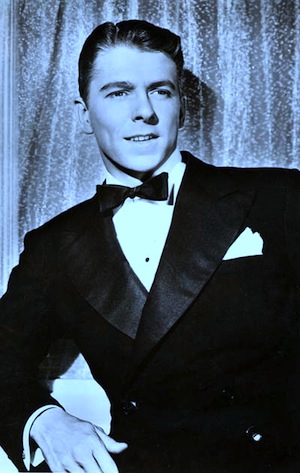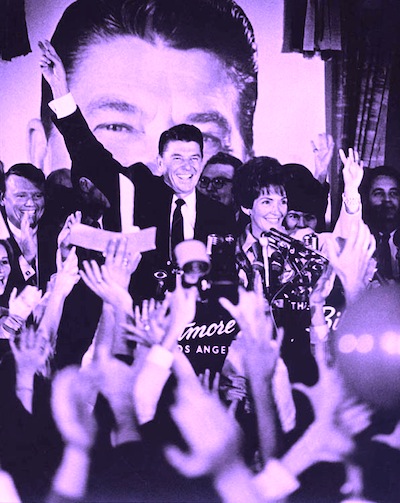By Joe Bendel. In an ironic way, President Ronald Reagan might have approved of the approach taken by his documentary profiler, Eugene Jarecki – at least in principle. While readily conceding Reagan’s personal virtues, Jarecki gives no quarter in the political arena. Such a strategy earned Jarecki Pavlovian praise for his ‘evenhandedness’ at the 2011 Sundance Film Festival, but it contributes little to the public discourse. Instead, Jarecki essentially offers viewers the same old canned talking points in Reagan, which debuts on HBO tonight.

Frankly, Jarecki’s polemical Reagan is best when covering the early Reagan years. A better actor than generally acknowledged, Reagan was eager to serve his country during WWII. Unfortunately, he was nearly as blind as a film critic, which to his genuine regret kept him out of combat duty. So the metaphor Jarecki ultimately latches onto is Reagan the lifeguard, the vision-impaired teenager who pulled seventy-seven floundering swimmers to safety.
By contrast, when addressing political issues, Jarecki is far from an honest broker. He only cursorily discusses Reagan’s time as the Screen Actor’s Guild President, largely to speculate on whether the future president named names. Had he delved deeper, he would have examined Reagan’s alarm at the extent to which Communist and fellow-traveling factions had co-opted Hollywood’s unions and progressive organizations. Of course, this would have challenged long held articles of faith regarding Hollywood and the HUAC committee, which Jarecki obviously was not about to do. Better to play it safe.
As a result, this omission leaves Reagan’s evolution from Roosevelt Democrat to Reagan Republican (if you will) largely unexplained. Context is not a priority here, though. All viewers are really told about his predecessor Jimmy Carter, for example, is that Carter had the ‘courage’ to make his ‘malaise’ speech. The word “stagflation,” however, is scrupulously ignored. The Iranian hostages are discussed, but apparently only to illustrate Reagan’s providential good fortune with their fortuitous release.
Jarecki interviews some Reagan insiders, but his editorial hand is always obvious. Peter Robinson has a chance to discuss Reagan’s frequently-lauded talents as a communicator, but policy analysis is reserved solely for the President’s partisan critics. So what do you suppose they say happened to ‘the rich,’ for example, during Reagan’s tenure?

One can also see this formal balance but practical bias in the appearances of Reagan’s family. Michael Reagan is only seen playing a cheerleader role while conducting a Reagan-themed tour (just long enough for the audience to suspect he might be trading on his father’s name). Conversely, Ron Reagan is allowed long, thoughtful camera time to whittle away at his father’s political legacy. It is worth noting, though, that Jarecki’s film directly contradicts the junior Reagan’s claim that his father exhibited symptoms of Alzheimer’s while in office.
Despite the near constant criticism of Reagan, Jarecki never comes close to suggesting that the iconic president ever acted out of self interest or cynical calculation. Even during the Iran-Contra affair, the ‘lifeguard’ metaphor is too hard for him to shake. Indeed, this is Reagan’s ultimate saving grace – or failure, depending on one’s perspective. Further diminishing the film’s seriousness, the constant use of vintage 1980’s pop tunes, like “99 Luftballoons” to underscore Reagan’s nuclear policy, is rather shallow and clichéd. (Sadly, it seems Jarecki was not able to clear the Buggles’ “Video Killed the Radio Star” for a “Great Communicator” segment.)
Disappointing but not surprising, Jarecki’s Reagan does a disservice to its subject and to its audience. It airs tonight (2/7) on HBO, following its recent Sundance premiere.
Posted on February 7th, 2011 at 11:28am.
But heaven forbid, someone attempt a truthful look at the “Kennedy legacy.” Camelot, shamalot.
Yes, it’s a bit hypocritical, isn’t it? HBO was one of the networks that turned The Kennedys down.
Ron Reagan (junior) is so sleazy. At least Patti Davis has quieted down.
One day Reagan will be proven the hero he was and I think Obama is part of that process (and I don’t have any contempt for Obama, but rather think he’s the dying gasp of “great societism” (if you will) which I would define as the strategic exchange of taxpayer dollars for votes under the guise of improving the lives of the poor and miserable. This scheme, once deduced, is what transformed Reagan, Hitchens, Orwell, and the neo-conservatives (the originals were Upper West Side of New York liberal Democrats) from FDR Democrats into at the very least skeptics of the the effectiveness of federal spending on social programs. Reagan’s gift was his intelligence and creativity which he used to communicate complicated ideas to people to busy to understand them, i.e., that government can destroy the lives of the poor, jobless, miserable, victimized, and otherwise opressed by the efforts it makes to “help” them; and to tax hard workers for that purpose only adds to the enormity of that injustice.
I think in the year 2300 when the USS Enterprise roams the stars, he will be remembered as that rarest of men, a man of science and faith, a man of vision and action, and indeed, The Life Guard.
Agreed on all points, C.
Thanks … great site … “long time listener.”
Many thanks!
Merely to add this for clarity, FDR’s domestic policies were good ones at least conceptually, however better they might have been rendered. Labor was in expensive and the government wisely decided to put people to work on labor intensive infrastructure projects. People saw the breadlines and were correctly eager for the government to do something. But those were low wage jobs meant to tide people over until the economy came back (and provided stimulus on the demand side). Today “great societists” want to give people $50,000/year + benefits, tenure, lax supervision, and guaranteed raises for life (because of civil service union power; civil service unions did not exist in the 30s). These great societists are less interested in helping the poor and unemployed and more interested in helping the Democratic Party become more powerful by rendering people dependent on it. I just did not want to leave the impression that government has no place is helping the destitute in an efficient way. In fact, ideally, the government can invest in the poor to the advantage of the rich as well. It is a good investment as long as it is well managed and vigilantly supervised.
I suspect Reagan himself would’ve agreed with your assessment.